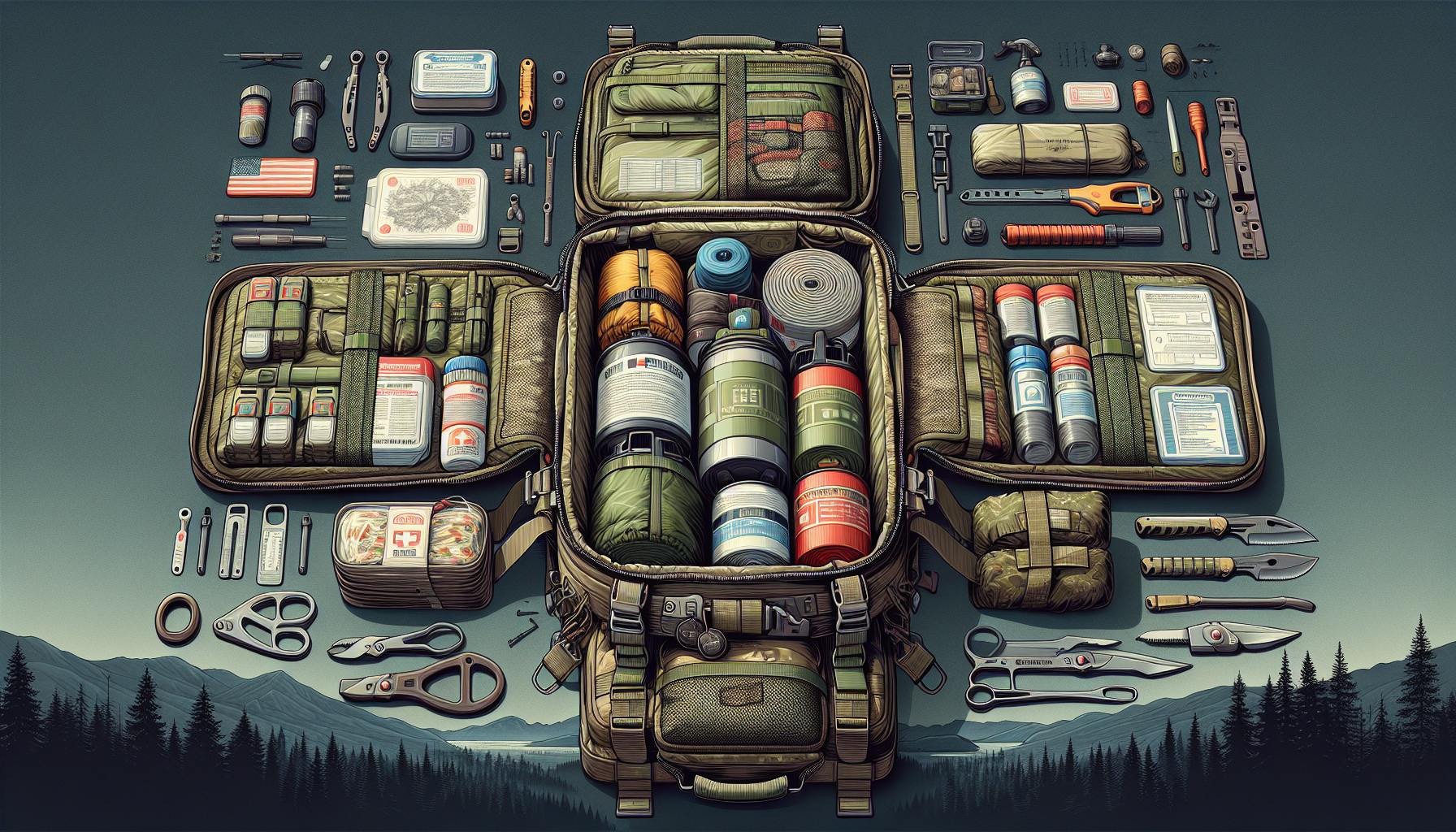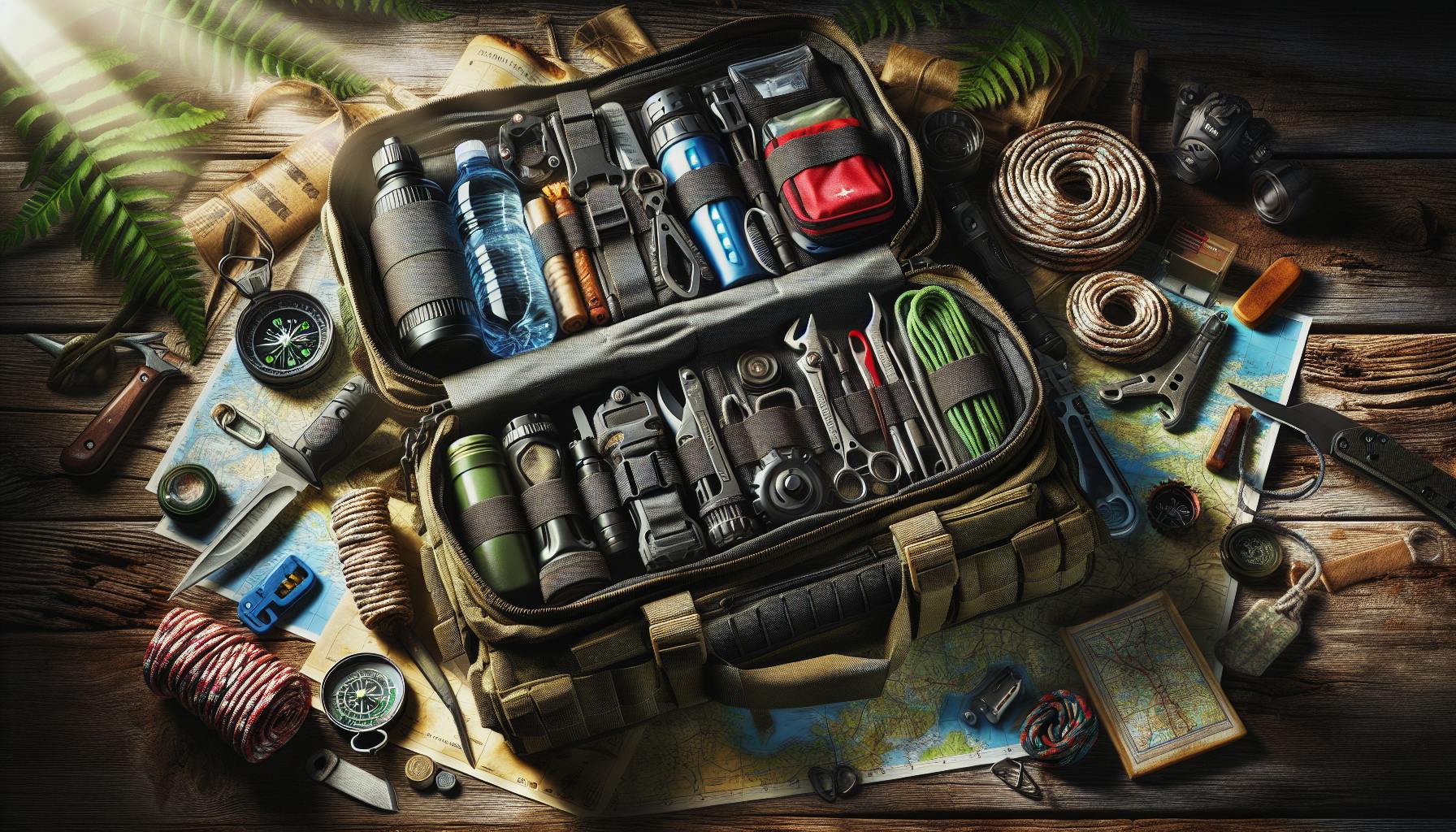Introduction: Why Urban Preppers Need a Tailored Go Bag
Natural disasters, infrastructure failures, and other emergencies can strike cities at any moment. Being prepared with a customized go bag full of essential supplies can mean the difference between life and death for urban preppers. According to FEMA, 60% of Americans live in cities with more than 50,000 people, emphasizing the vast number of preppers facing unique urban challenges. When the grid goes down or crisis strikes, city dwellers will likely deal with crowds, lack of shelter space, transportation shutdowns, and navigating streets on foot. That's why it's crucial to tailor go bag checklists specifically for the needs of city residents.
As urban prepping continues to gain popularity, having the right supplies is key to maximizing safety and resilience. This article will provide an urban go bag list focused on the most important items for city disasters and emergencies. We'll cover gear for navigation, food/water, first aid, hygiene, tools, comms, and critical documents. Follow this urban go bag checklist to ensure you have the essentials whether facing a natural disaster, infrastructure failure, civil unrest, or other crisis in your city.
Essential Urban Go Bag Considerations
When preparing a go bag for a city environment, keep in mind:
-
Pack light. Space is extremely limited in urban areas, so minimalist packing is essential. Only include versatile items that serve multiple purposes.
-
Prioritize portable, compact items that take up little room. You may need to travel long distances on foot so bulky gear won't be practical.
-
Use inconspicuous bags or cases to avoid drawing unwanted attention to your supplies. Backpacks, messenger bags, and duffel bags are all urban-friendly options.
-
Prepare for urban-specific challenges like navigating crowded streets, public transportation and power grid shutdowns, lack of shelter space, sanitation issues, and civil unrest.
-
Have contingencies for crowds/lines, health risks from tight quarters, finding water without tap access, getting around without public transit, securing food/medical supplies, etc.
Key Supplies for Navigation
Relying on digital maps or phones is risky if the grid goes down. Be equipped to navigate the city streets without technology:
-
Sturdy, comfortable walking shoes to travel long distances on foot over rough terrain. Waterproof boots are ideal for cities.
-
A portable, paper map of your city and surrounding metro area in case digital navigation fails. Know alternate routes and meeting places.
-
Compass and mini survival guide with basic navigation skills to orient yourself without streets signs or landmarks.
-
LED flashlights plus extra batteries - pack a few small keychain lights. Essential if traveling at night.
-
Lightweight, emergency rain poncho that can double as improvised shelter. Consider a reflective vest for visibility.
Food/Water Supplies
With supply chain disruptions likely, pack calorie-dense foods and ways to source/purify water:
-
Highly caloric energy/granola bars like Clif Bars take up little room. Help maintain energy for long treks.
-
Powdered electrolyte drink mixes like Gatorade to flavor water and replenish nutrients when active.
-
Collapsible water bottle you can refill such as Platypus SoftBottle. Easy to store when empty.
-
Water purification tablets or portable water filters like the Grayl Geopress purify from untreated sources.
-
Pre-packaged meals ready to eat (MREs) like those from SOPAKCO. Long shelf life and contain calorie-dense foods.
First Aid Supplies
Pack key medical gear to treat injuries without professional help:
-
Adhesive bandages in multiple sizes for minor cuts, blisters. Choose waterproof for wet conditions.
-
Gauze rolls, self-adherent wraps, butterfly bandages for wound care and stabilization.
-
Antibiotic ointment packets to prevent infection in scrapes or cuts.
-
OTC pain medication like ibuprofen or acetaminophen to relieve aches or reduce fever.
-
Cotton swabs, medical tape, trauma shears/scissors for gear repairs and first aid.
-
Mylar emergency blanket retains 80% of body heat and can treat shock.
Sanitation and Hygiene Items
Maintaining personal hygiene prevents illness when sheltering together:
-
Travel-size soap, alcohol-based hand sanitizer, toilet paper for cleanliness when bathrooms are unavailable.
-
Toothbrush, toothpaste - dental hygiene remains important even in emergencies.
-
Highly absorbent, quick-drying camping towel takes up little space.
-
Tissue packets, plastic bags for personal waste disposal without plumbing access. Consider portable toilet bags.
-
N95 protective face masks - filter 95% of air particles to reduce disease risk.
Essential Tools and Gear for Urban Go Bags
In addition to basics for survival, include versatile tools to enhance safety and convenience:
-
Swiss army knife or multi-tool with integrated features like knife blades, screwdrivers, can opener, pliers, etc.
-
Duct tape wraps - make emergency repairs, secure gear, first aid uses, improvised solutions.
-
550 paracord - build shelters and traps, make slings, replace broken straps and shoelaces, etc.
-
Safety pins - temporary wound closures, replace broken fasteners, improvise small repairs.
-
LED headlamp allows hands-free lighting for navigation or working in the dark.
-
Camping stove like the Jetboil Flash can boil water without electricity access.
Protective Items
Reduce injury and illness risks with protective gear:
-
N95 or KN95 face masks to filter 95% of airborne particles and respiratory droplets.
-
Durable leather work gloves to safely handle debris, hazardous materials, and biohazards.
-
Impact-resistant safety goggles provide eye protection from dust, projectiles, and contaminants.
-
Ear plugs like 3M foam plugs block hazardous noise levels like explosions.
-
Emergency sleeping bags, mylar blankets provide portable shelter and retain body heat.
Communications Gear
Stay updated on news and coordinate with others:
-
Walkie talkies allow short-range communication under a mile. Look for FRS/GMRS models.
-
Crank or solar powered radios from Sony or Goal Zero provide news without batteries.
-
Backup chargers like Anker PowerCore can recharge phones when outlets are unavailable.
-
Whistles or signal flares help location signaling over distance and in poor visibility.
Key Documents
Keep copies of critical paperwork to verify identity and medical needs:
-
Copies of identification cards, driver's license, passports, birth certificate to prove who you are. Store online or in waterproof bags.
-
List of emergency contacts - family, friends, out-of-town relatives. Ensure you can reach them.
-
Medical information - medications, conditions, allergies, doctor details. Helps first responders.
-
Extra cash and coins in case electronic payments fail and banks are unavailable.
-
Printed maps and directions to meet up places, shelters, rally points. Don't rely solely on phones.
Bags and Cases for Go Bag Storage
Choose an inconspicuous bag or case that fits your supplies and lifestyle:
-
Backpacks with chest straps and hip belts allow hands-free carrying but may identify you as a prepper. Keep it low profile. Look for 20+ liter capacity.
-
Duffel bags are budget-friendly and have space for odd-shaped items but no internal organization. Consider adding molle panels.
-
Messenger bags blend in as an everyday item for a less conspicuous option. Look for water resistance.
-
Suitcases with wheels allow heavy loads to be rolled but may be hard to maneuver over rough terrain.
-
Sealable plastic storage containers are waterproof and protect your gear but take up more space.
Final Thoughts
Customizing your urban go bag checklist is crucial to account for the unique challenges of cities. Focus on light and compact gear for first aid, navigation, water purification, multi-use tools, protective items, and other essentials in this guide. Tailor your supplies to your personal needs and specific city. With the right emergency go bag, urban preppers can mobilize quickly during any disaster while having the critical supplies to maintain safety. Use this urban go bag list to ensure you have versatile gear and essential items that maximize preparedness for urban emergencies. Regularly practice evacuating with your bag and assess any gaps that need to be filled. Don't wait until it's too late - get your city go bag prepared today.


